带薪年休假规定 英文版 annual leave
英语年假请假条模板

英语年假请假条模板英语年假请假条模板英语年假请假条模板or immediate treatment of m teeth. I have been experiening a stinging pain, depriving me of m sleep during the past fortnight. The situation ould orsen, should infetion our. Conerning m orkloa d: As Frida is not as bus as the other eekdas, I think a one-da leave this Frida ma be the best solution. I apologize for the inonveniene m absene from ork ma ause. 接着,在假条的最后一段,应写上您希望获得准假的句子,或者具体等候答复的Thanks. I ill all ou at 1:30p.m. or ou an all me at an time. 最后,你只需要把以上几段综合起来,就是一则完整的请假条,看看,是不是很简单?那么关于请假,我们应该懂得哪些理由和英语单词呢?take a da off ask for leave (请假) grant leave (准假)sik leave (病假) maternit leave(产假) annual leave (年假) on leave告假中 paid leave带薪假工作中,要使用英语的地方太越多了,要用英语写邮件、用英语发传真打电话、文件是英语的,电脑内设程序也都是英文版的,英语充斥着职场和生活,职场中还有哪些场景会用到英语呢?安格英语每周三晚20:00英语公开课,教你学会职场常用口语及技能,分分钟玩转职场!篇二:年假请假条请假条尊敬的领导:根据国家和单位关于带薪年休假的有关规定,我拟于201X年 10 月8日至201X年批准为盼! 特此申请月12日休假5 天。
BEC商务英语热词:带薪休假英文怎么说

BEC商务英语热词:带薪休假英文怎么说为了帮助大家备考bec,下面小编给大家带来BEC商务英语热词:带薪休假英文怎么说,希望对你们有所帮助。
BEC商务英语热词:带薪休假英文怎么说?Employees who have worked continuously for one year or more are entitled to paid annual leave.职工连续工作满12个月以上的,享受带薪年休假。
New Jersey may be poised to become the third state to require companies to offer six weeks of paid leave to workers wishing to care for a new child or sick relative.新泽西州将要求公司给予员工六周带薪休假,这些假期可以用来照顾新生婴儿或生病的亲戚。
此前已有另外两个州开始实施这项措施了。
"热词”解析带薪休假实际上并不是一个新词,早在2008年,国家就出台了《职工带薪年休假条例》以保证员工的正当权利。
上文中的第一句例句即引用自该条例的英文版。
此处把带薪年休假译为“paid annual leave”,由此引申出来的年假即为“annual leave”。
第二句例句引用自美联社的一篇报道,可见带薪休假英文表达为paid leave是通用的说法。
除了paid leave外,还有几种可以表示带薪休假的英文表达:paid vacation(美式用法),paid holiday(英式用法),paid time off(较口语)。
例句:Mr. Saunders believes that he deserves more paid vacations.桑德斯先生认为他理应得到更多的带薪休假。
The Luxembourg-based court insisted that employers should honour workers’ rights to both time off sick and paid holidays.这家位于卢森堡的法院坚持认为,雇主必须尊重员工休假期间生病补假和带薪假期的权利。
年休假英文怎么说英语怎么写
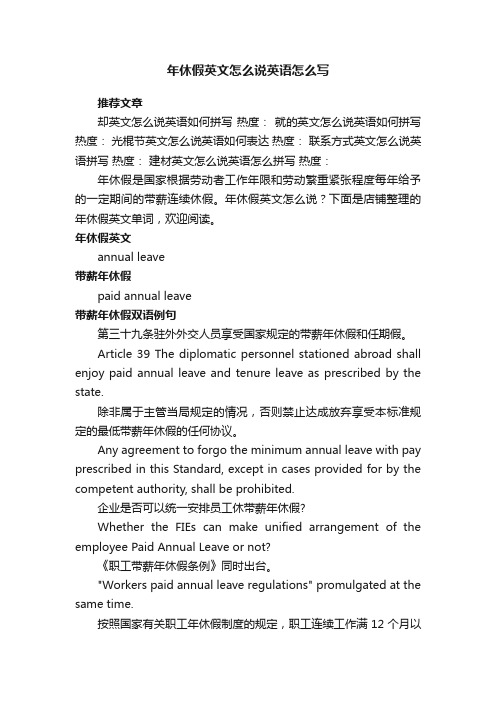
年休假英文怎么说英语怎么写推荐文章却英文怎么说英语如何拼写热度:就的英文怎么说英语如何拼写热度:光棍节英文怎么说英语如何表达热度:联系方式英文怎么说英语拼写热度:建材英文怎么说英语怎么拼写热度:年休假是国家根据劳动者工作年限和劳动繁重紧张程度每年给予的一定期间的带薪连续休假。
年休假英文怎么说?下面是店铺整理的年休假英文单词,欢迎阅读。
年休假英文annual leave带薪年休假paid annual leave带薪年休假双语例句第三十九条驻外外交人员享受国家规定的带薪年休假和任期假。
Article 39 The diplomatic personnel stationed abroad shall enjoy paid annual leave and tenure leave as prescribed by the state.除非属于主管当局规定的情况,否则禁止达成放弃享受本标准规定的最低带薪年休假的任何协议。
Any agreement to forgo the minimum annual leave with pay prescribed in this Standard, except in cases provided for by the competent authority, shall be prohibited.企业是否可以统一安排员工休带薪年休假?Whether the FIEs can make unified arrangement of the employee Paid Annual Leave or not?《职工带薪年休假条例》同时出台。
"Workers paid annual leave regulations" promulgated at the same time.按照国家有关职工年休假制度的规定,职工连续工作满12个月以上即可享受带薪年休假。
annual leave使用例句

annual leave使用例句【释义】annual leave年假:每年向职员授予的休假时间。
【短语】1annual leave terms年假条款2annual leave pay年假薪酬3Paid annual leave带薪年假4final annual leave最终年假5split annual leave分期放取年假6annual leave passage年假旅费7overseas annual leave海外年假8annual leave entitlement可享有的年假【例句】1How much annual leave do you get?你们的年假有多长?2Our annual leave is thirty days.我们每年休假30天。
3He has six weeks annual leave.他一年有六个星期的休假。
4He is on annual leave.他休年假去了。
5One of its services is scheduling annual leave.它的服务之一就是安排年假。
6There is no mandatory paid annual leave in the U.S.美国没有强制带薪年假。
7When will you take the balance of your annual leave?你打算什么时候使用剩余的年假?。
8Party B shall be entitled to annual leave with salary.乙方按国家规定享受甲方的带薪年假。
9Me:Maximum16days,that's the annual leave I can get.他没接最多16天。
那时我所有的年休假。
10Tom:Are you looking forward to taking your annual leave this year?汤姆︰你对今年的年假很期待吗?11Justified absences from work shall not be considered as annual leave.合理的缺勤不应被视作年假。
企业职工带薪年休假实施办法中英版
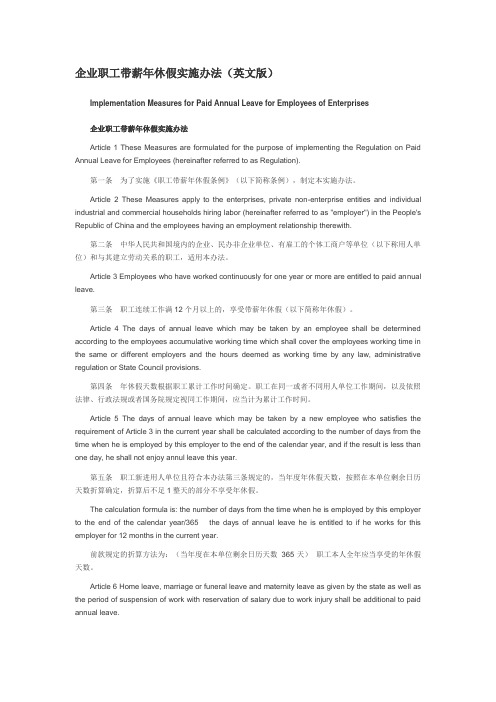
Article 3 Employees who have worked continuously for one year or more are entitled to paid annual leave.
前款规定的折算方法为:(当年度在本单位剩余日历天数÷365天)×职工本人全年应当享受的年休假天数。
Article 6 Home leave, marriage or funeral leave and maternity leave as given by the state as well as the period of suspension of work with reservation of salary due to work injury shall be additional to paid annual leave.
第一条 为了实施《职工带薪年休假条例》(以下简称条例),制定本实施办法。
Article 2 These Measures apply to the enterprises, private non-enterprise entities and individual industrial and commercial households hiring labor (hereinafter referred to as "employer") in the People's Republic of China and the employees having an employment relationship therewith.
职工带薪年休假条例(英文版)
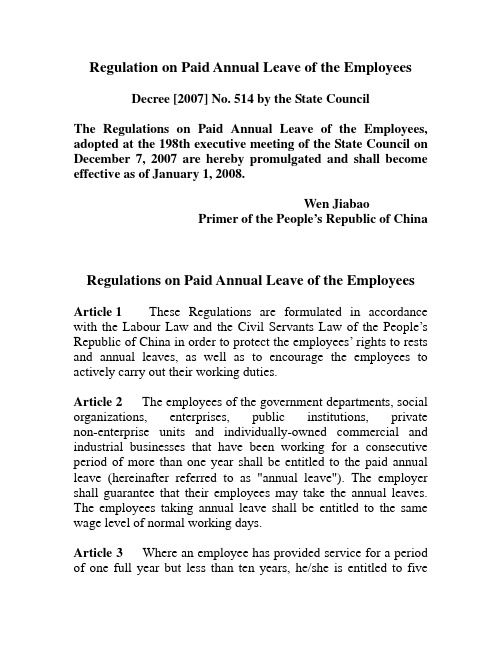
Regulation on Paid Annual Leave of the Employees Decree [2007] No. 514 by the State CouncilThe Regulations on Paid Annual Leave of the Employees, adopted at the 198th executive meeting of the State Council on December 7, 2007 are hereby promulgated and shall become effective as of January 1, 2008.Wen JiabaoPrimer of the People’s Republic of ChinaRegulations on Paid Annual Leave of the Employees Article 1 These Regulations are formulated in accordance with the Labour Law and the Civil Servants Law of the People’s Republic of China in order to protect the employees’ rights to rests and annual leaves, as well as to encourage the employees to actively carry out their working duties.Article 2 The employees of the government departments, social organizations, enterprises, public institutions, private non-enterprise units and individually-owned commercial and industrial businesses that have been working for a consecutive period of more than one year shall be entitled to the paid annual leave (hereinafter referred to as "annual leave"). The employer shall guarantee that their employees may take the annual leaves. The employees taking annual leave shall be entitled to the same wage level of normal working days.Article 3Where an employee has provided service for a periodof one full year but less than ten years, he/she is entitled to fivedays of annual leave; where he/she has served for a period of ten full years but less than twenty years, the entitled annual leave shall be ten days; and for a service period over twenty years, the entitled annual leave shall be fifteen days.The statutory national holidays and rest days shall not be included in the annual leave.Article 4 An employee shall not be entitled to annual leave for the current year where he/she is under any of the following circumstances:(1) The employee is entitled to summer and winter vacations in accordance with the laws and regulations, and the number of days of such vacations exceeds that of his/her annual leave;(2) The employee has accumulatively taken more than twenty days of casual leave and the employer has not reduced his/her wage level thereof in accordance with the regulations;(3) The employee with service period of one full year but less than ten years has accumulatively taken more than two months of sick leave;(4) The employee with service period of ten full years but less than twenty years has accumulatively taken more than three months of sick leave;(5) The employee with service period over twenty years has accumulatively taken more than four months of sick leave.Article 5 The employer shall, considering the specific conditions of production and work, as well as the individual preferences of the employees, coordinate and arrange the annual leave of its employees.Annual leave may be arranged in a concentrated period or in several periods of time within one year, but it generally shall not span beyond one year. The employers may make annual leavearrangement for their employees that span beyond one year where they need to make such arrangement due to their production and job specialties.Where the employers can not arrange annual leave for the employees due to production or working requirements, they may, with the consent of the concerned employees, not arrange annual leave. For the annual leave that should have been taken by the employees but otherwise, the employers shall pay remuneration for annual leave to the concerned employees rating 300% of the daily wage rate of such employees.Article 6The personnel administration departments and labour and social security administration departments of the People's Governments at county level or above shall actively conduct supervision and examination on the implementation of these Regulations by the employers as per their respective jurisdictions. The trade unions shall protect the employees’ rights to annual leave in accordance with the laws and regulations.Article 7 Where an employer fails to arrange annual leave for the employees and meanwhile refuses to pay remuneration for annual leave in accordance with these Regulations, the personnel departments or the labour and social security departments of the People's Governments at county level or above shall order rectification within a period of time as per their respective jurisdictions. In case that no rectification has been made within the time limit, such employer, in addition to the payment of remuneration for annual leave, shall be ordered to make compensation to the concerned employees rating the same amount with the remuneration for annual leave. Where the employer refuses to make payment of remuneration for annual leave and compensation, and the personnel of such employer are public servants or administered in reference to the Civil Servants Law, theperson-in-charge that is held directly responsible and other directly responsible personnel shall be penalized in accordance with the law, if such employer is categorized otherwise, the labour and social security department, the personnel department or the concerned employee shall apply for compulsory enforcement by a People's Court.Article 8 Where the employees and the employers confront disputes over annual leave, the relevant issues shall be handled in accordance with relevant laws and administrative regulations of the State.Article 9 The personnel administration department and the labour and social security administration department of the State Council shall each formulate the implementing rules of the Regulations in accordance with their respective authorities.Article 10 These Regulations shall become effective as of January 1, 2008.(In case of any discrepancy between the English translation and the original Chinese text, the Chinese text shall prevail. ---translator)职工带薪年休假条例中华人民共和国国务院令第514号《职工带薪年休假条例》已经2007年12月7日国务院第198次常务会议通过,现予公布,自2008年1月1日起施行。
年休假(Annualleave)
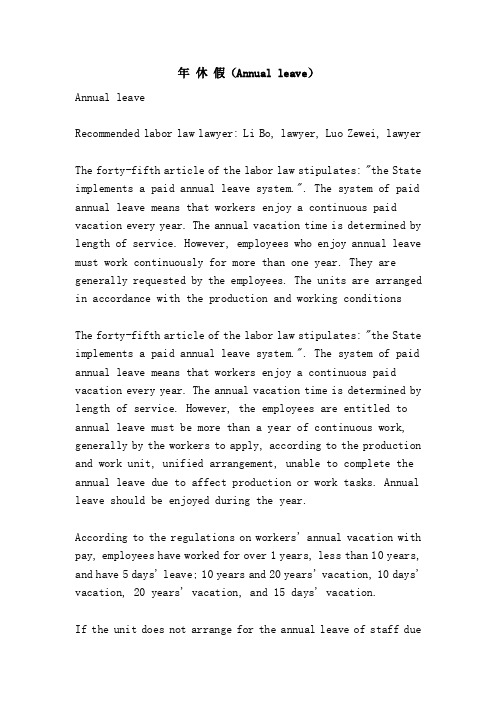
年休假(Annual leave)Annual leaveRecommended labor law lawyer: Li Bo, lawyer, Luo Zewei, lawyerThe forty-fifth article of the labor law stipulates: "the State implements a paid annual leave system.". The system of paid annual leave means that workers enjoy a continuous paid vacation every year. The annual vacation time is determined by length of service. However, employees who enjoy annual leave must work continuously for more than one year. They are generally requested by the employees. The units are arranged in accordance with the production and working conditionsThe forty-fifth article of the labor law stipulates: "the State implements a paid annual leave system.". The system of paid annual leave means that workers enjoy a continuous paid vacation every year. The annual vacation time is determined by length of service. However, the employees are entitled to annual leave must be more than a year of continuous work, generally by the workers to apply, according to the production and work unit, unified arrangement, unable to complete the annual leave due to affect production or work tasks. Annual leave should be enjoyed during the year.According to the regulations on workers' annual vacation with pay, employees have worked for over 1 years, less than 10 years, and have 5 days' leave; 10 years and 20 years' vacation, 10 days' vacation, 20 years' vacation, and 15 days' vacation.If the unit does not arrange for the annual leave of staff dueto the needs of the job, it may not arrange for the workers' annual leave without the consent of the employees themselves. For employees whose annual vacation days should not be taken off, the unit shall pay annual wages and salaries in accordance with 300% of the daily wage income of the staff and workers.How is overtime calculated?The standard work hour system can be carried out according to the thirty-sixth labor law. The working system of the State shall not exceed eight hours a day, and the average working hours shall not exceed forty-four hours per week".Article thirty-sixth the working hours of the workers do not exceed 8 hours a day, the average working hours of no more than 44 hours working hours system.The thirty-first law of the labor contract stipulates that the employing unit shall strictly implement the labor quota standard and shall not compel or force laborers to work overtime. Where the employer arranges for overtime work, it shall pay overtime pay to the worker in accordance with the relevant regulations of the state.Article forty-fourth of the labor law has one of the following circumstances, the employer shall pay the remuneration in accordance with the following standards higher than the normal working hours of workers' wages:(1) to arrange for workers to extend their working hours, and to pay one hundred and fifty percent of the wages not less thanthe wages;(two) working arrangements for the rest day cannot arrange the work, pay wages not less than two hundred percent of the wages;(three) to pay the wages of three hundred percent of the wages of the workers who work in the statutory holiday.Overtime related knowledge:Overtime pay refers to the labor remuneration paid by laborers in accordance with the requirements of production and work of the employing units and continuing to produce labor or work outside the prescribed work hours. Working overtime, prolonging working hours, and increasing extra labor should be paid reasonably. For workers, overtime is a kind of compensation, because the pay excess labor; for employers to pay overtime, can effectively restrain the employer at random to lengthen working hours, to protect the legitimate rights and interests of workers. According to the labor law and the relevant regulations of the state, the employing unit shall pay the wages paid in excess of the normal working hours of the workers in the case of prolonging the working hours of the laborers, that is, overtime pay. This article affirms the legislative spirit of the labor law and other relevant state regulations concerning the payment of overtime pay.In accordance with the provisions of the labor law article forty-fourth, the specific standard is: pay overtime arrangements for workers in the standard working days to lengthen working hours, pay wages not less than one hundred andfifty percent of the wages of workers; work arrangements for the rest day cannot arrange the work, non payment of wages lower than the wages paid two hundred percent; arrangements for working in statutory leave, pay no less than three hundred percent of the wages.Beyond standard work time extended working hours, rest days, statutory holidays are arranged to work, the workers occupied the rest of the time, should be strictly limited, higher than the normal working time of payment of wages is a limitation measures adopted the country. However, the organization of labor in the above three kinds of situations are not exactly the same, such as the legal holiday for employees, the rest is more important than usual and rest days, also affect the spiritual life style of workers and other social activities, it is unable to make up for compensatory measures, therefore, should be given a higher salary. When the employer meets the above conditions and arranges for the workers to work overtime, they shall pay the overtime fees in strict accordance with the labor law and the provisions of this law. Which belong to a case of overtime, should implement the provisions of the law made in this case, each other can not be confused, can not replace, otherwise is a violation of the labor law and the law, is a violation of the rights of workers, shall bear legal responsibility according to law.In accordance with the provisions of this article, forcing labourers to work overtime in disguised form shall be regarded as contrary to the provisions of the labor law and the working hours of workers shall be extended. A worker may, in accordance with the labor law and the relevant provisions of this law,require the employer to reissue its remuneration for working overtime in order to complete the quota of labor in excess of a reasonable amount.Specific calculation of statutory holiday overtimeRecommended labor law lawyer: Li Bo, lawyer, Luo Zewei, lawyerThe calculation of statutory holiday overtime 1. assuming that the wage is 1500 yuan, then the other 100 holiday overtime, so it is legal? The following algorithm (1500/30*3) - (1500/30) on the end of the month because the wages paid, so only two times the compensation 2., assuming a month 4 Sunday, Sunday overtime on the other, a double salary is 50 yuan. Because it is still get a basic salary overtimeSpecific calculation of statutory holiday overtime1. assuming the salary is 1500 yuan, then the holiday overtime company issued another 100, so legal?The following is the algorithm, (1500/30*3) - (1500/30) on the end of the month because the wages paid, so only two times the compensation,2., assuming 4 months a month, Sunday, Sunday work overtime, the other doubled wages, that is 50 yuan. Because that day is not working overtime, the basic wage is still the same, then work overtime only with the usual wage is the sameQ1: wants to ask you, that's the rule of law. The bottom lineis three times the basic salary, or another three timesQ2: and the basic daily wage algorithm, is 1500/30 or 1500/26, if the latter, that is, there is no basic wage holiday day terms?Considering the network law:Q1 holiday overtime (11 days) is more than 3 times, and if your daily wage is 100 yuan, overtime pay is based on 100 yuan to pay you 300 yuan overtime payQ2, you first need to understand what is "system work day" and "paid work day""I. calculation of the working hours of the systemWorking days: 365 days, -104 days (rest days), -11 days (legal holidays) =250 daysSeason working days: 250 days / 4 days / season =62.5 seasonMonthly working days: 250 days, December =20.83 days / monthWorking hours: monthly, quarterly, annual work days multiplied by 8 hours per day.Two, daily wage, hourly wage conversionDaily wage: monthly salary, monthly paid daysSalary: monthly salary / hour (monthly paid days * 8 hours).Monthly paid days = (365 -104 days), December =21.75 daysIf your salary is 2175 yuan, then the daily wage is 100 yuan, holiday overtime is 300 yuan. If there is a holiday overtime this month, it should be issued to you 2175+300=3475 yuan。
职工带薪年休假条例(英文版)汇总
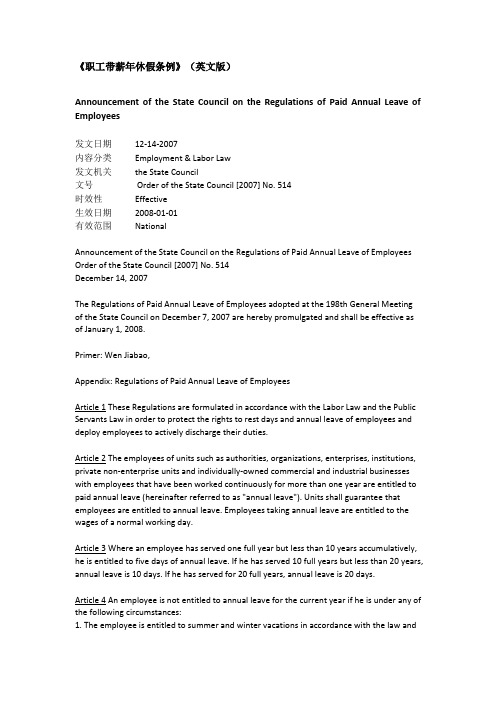
《职工带薪年休假条例》(英文版)Announcement of the State Council on the Regulations of Paid Annual Leave of Employees发文日期12-14-2007内容分类Employment & Labor Law发文机关the State Council文号 Order of the State Council [2007] No. 514时效性Effective生效日期2008-01-01有效范围NationalAnnouncement of the State Council on the Regulations of Paid Annual Leave of Employees Order of the State Council [2007] No. 514December 14, 2007The Regulations of Paid Annual Leave of Employees adopted at the 198th General Meeting of the State Council on December 7, 2007 are hereby promulgated and shall be effective as of January 1, 2008.Primer: Wen Jiabao,Appendix: Regulations of Paid Annual Leave of EmployeesArticle 1 These Regulations are formulated in accordance with the Labor Law and the Public Servants Law in order to protect the rights to rest days and annual leave of employees and deploy employees to actively discharge their duties.Article 2 The employees of units such as authorities, organizations, enterprises, institutions, private non-enterprise units and individually-owned commercial and industrial businesses with employees that have been worked continuously for more than one year are entitled to paid annual leave (hereinafter referred to as "annual leave"). Units shall guarantee that employees are entitled to annual leave. Employees taking annual leave are entitled to the wages of a normal working day.Article 3 Where an employee has served one full year but less than 10 years accumulatively, he is entitled to five days of annual leave. If he has served 10 full years but less than 20 years, annual leave is 10 days. If he has served for 20 full years, annual leave is 20 days.Article 4 An employee is not entitled to annual leave for the current year if he is under any of the following circumstances:1. The employee is entitled to summer and winter vacations in accordance with the law andthe number of days of such vacations is more than that of his annual leave;2. The employee has taken more than 20 days of casual leave accumulatively and his unit does not deduct wages in accordance with provisions;3. The employee has served one full year accumulatively but less than 10 years and has taken more than two months of sick leave accumulatively;4. The employee has served 10 full years accumulatively but less than 20 years and has taken more than three months of sick leave accumulatively;5. The employee has served more than 20 full years and has taken more than four months of sick leave accumulatively.Article 5 Units shall coordinate and arrange for the annual leave of employees on the basis of the specific conditions of production and work and the individual preference of employees.Annual leave may be centrally arranged within one year or in several periods and does not span more than one year in general. Units may make such arrangement that spans more than one year if they have a genuine need for such arrangement due to production and job specialties.Units that cannot arrange for annual leave for employees due to job requirements, they may not arrange for annual leave with the consent of such employees. In respect of the annual leave that should have been taken but otherwise, units shall pay wage remuneration to such employees at the rate of 300% of the daily wage income of such employees.Article 6 The personnel department and the labor security department of people's governments at the county level or above shall actively conduct supervision and examination on the implementation of these Regulations by units in accordance with their authority.Labor organizations shall protect the rights to annual leave of employees in accordance with the law.Article 7 Where a unit fails to arrange for annual leave for employees and pay wage remuneration on annual leave in accordance with the Regulations, the personnel department or the labor security department of people's governments at the county level or above shall order rectification within a time limit. If no rectification is made within the time limit, such unit shall be ordered payment of wage remuneration on annual leave and also make additional compensation to employees on the basis of the amount of the wage remuneration of annual leave. Where no wage remuneration on annual leave or compensation is made, and the personnel of such units are public servants or administered with reference to the Public Servants Law, the person-in-charge that is directly responsible and other directly responsible personnel shall be punished in accordance with the law, if such unit belongs to other categories, the labor security department, the personnel department or the employee shall apply for compulsory implementation by a people's court.Article 8 Where employees and units have dispute over annual leave, it shall be dealt with in accordance with the relevant laws and administrative regulations of the state.Article 9 The personnel department of the State Council and the labor security department of the State Council shall formulate implementing procedures of the Regulations respectively in accordance with their respective authority.Article 10 The Regulations shall be effective as of January 1, 2008.。
- 1、下载文档前请自行甄别文档内容的完整性,平台不提供额外的编辑、内容补充、找答案等附加服务。
- 2、"仅部分预览"的文档,不可在线预览部分如存在完整性等问题,可反馈申请退款(可完整预览的文档不适用该条件!)。
- 3、如文档侵犯您的权益,请联系客服反馈,我们会尽快为您处理(人工客服工作时间:9:00-18:30)。
职工带薪年休假条例(英文版)国务院令[2007]第514号2007年12月14日Announcement of the State Council on the Regulations of Paid Annual Leave of EmployeesOrder of the State Council [2007] No. 514December 14, 2007The Regulations of Paid Annual Leave of Employees adopted at the 198th General Meeting of the State Council on December 7, 2007 are hereby promulgated and shall be effective as of January 1, 2008.Primer: Wen Jiabao,Appendix: Regulations of Paid Annual Leave of EmployeesArticle 1 These Regulations are formulated in accordance with the Labor Law and the Public Servants Law in order to protect the rights to rest days and annual leave of employees and deploy employees to actively discharge their duties.Article 2 The employees of units such as authorities, organizations, enterprises, institutions, private non-enterprise units andindividually-owned commercial and industrial businesses with employees that have been worked continuously for more than one year are entitled to paid annual leave (hereinafter referred to as "annual leave"). Units shall guarantee that employees are entitled to annual leave. Employees taking annual leave are entitled to the wages of a normal working day.Article 3 Where an employee has served one full year but less than 10 years accumulatively, he is entitled to five days of annual leave. If he has served 10 full years but less than 20 years, annual leave is 10 days. If he has served for 20 full years, annual leave is 20 days.Article 4 An employee is not entitled to annual leave for the current year if he is under any of the following circumstances:1. The employee is entitled to summer and winter vacations in accordance with the law and the number of days of such vacations is more than that of his annual leave;2. The employee has taken more than 20 days of casual leave accumulatively and his unit does not deduct wages in accordance with provisions;3. The employee has served one full year accumulatively but less than 10 years and has taken more than two months of sick leave accumulatively;4. The employee has served 10 full years accumulatively but less than 20 years and has taken more than three months of sick leave accumulatively;5. The employee has served more than 20 full years and has taken more than four months of sick leave accumulatively.Article 5 Units shall coordinate and arrange for the annual leave of employees on the basis of the specific conditions of production and work and the individual preference of employees.Annual leave may be centrally arranged within one year or in several periods and does not span more than one year in general. Units may make such arrangement that spans more than one year if they have a genuine need for such arrangement due to production and job specialties.Units that cannot arrange for annual leave for employees due to job requirements, they may not arrange for annual leave with the consent of such employees. In respect of the annual leave that should have been taken but otherwise, units shall pay wage remuneration to such employees at the rate of 300% of the daily wage income of such employees.Article 6 The personnel department and the labor security department of people's governments at the county level or above shall actively conduct supervision and examination on the implementation of these Regulations by units in accordance with their authority.Labor organizations shall protect the rights to annual leave of employees in accordance with the law.Article 7 Where a unit fails to arrange for annual leave for employees and pay wage remuneration on annual leave in accordance with the Regulations, the personnel department or the labor security department of people's governments at the county level or above shall order rectification within a time limit. If no rectification is made within the time limit, such unit shall be ordered payment of wage remuneration on annual leave and also make additional compensation to employees on the basis of the amount of the wage remuneration of annual leave. Where no wage remuneration on annual leave or compensation is made, and the personnel of such units are public servants or administered with reference to the Public Servants Law, the person-in-charge that is directly responsible and other directly responsible personnel shall be punished in accordance with the law, if such unit belongs to other categories, the labor security department, the personneldepartment or the employee shall apply for compulsory implementation by a people's court.Article 8 Where employees and units have dispute over annual leave, it shall be dealt with in accordance with the relevant laws and administrative regulations of the state.Article 9 The personnel department of the State Council and the labor security department of the State Council shall formulate implementing procedures of the Regulations respectively in accordance with their respective authority.Article 10 The Regulations shall be effective as of January 1, 2008。
